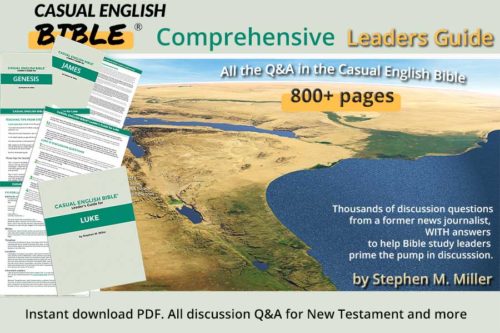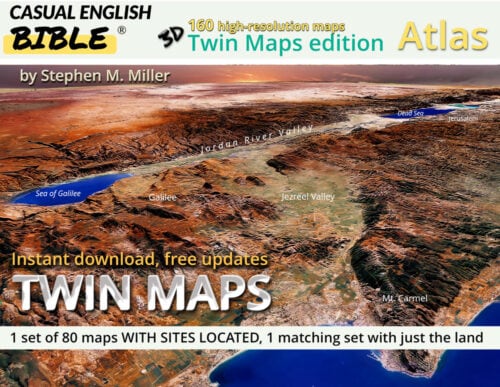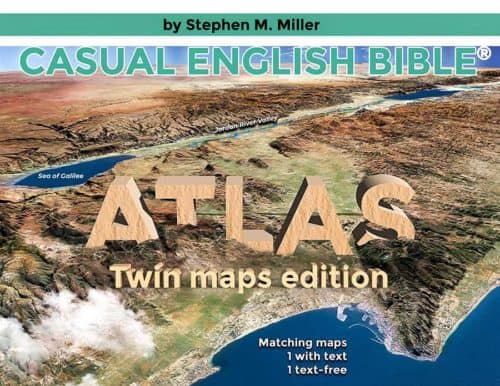Judges 6
God convinces Gideon to fight raiders
Raiders come and Israel hides in caves
1People in Israel did things the LORD said was wrong. So, for seven years the LORD let raiders from Midian make life miserable for them. 2Midianites were so strong and so vicious that Israelites built emergency shelters in the hills, in caves, and in places easy to defend.3Throughout harvesttime, every spring, summer, and fall, raiders came to Israel. They included Amalekites, Midianites and others east of the Jordan River. 4They camped anywhere they wanted and destroyed everything they touched as far south as Gaza. They didn’t leave anything behind for the people to start over. Not a sheep, a cow, or a donkey.
5They came like a swarm of locusts. They smothered the land with their tents and their livestock. They had more camels than anyone could count. They devoured and destroyed the land. 6Misery is all Israel knew. So, they turned to the LORD for help. 7People of Israel wept to the LORD as they prayed about Midian.
A message from God
8The LORD sent a prophet with a message for Israel.“This is what the LORD says, the God of Israel:
I brought you out of Egypt. I freed you from slavery.
I drove out the locals and gave you their land.
10I told you that I’m the LORD your God and it’s not okay to worship the local Amorite gods. You ignored me.”
Gideon’s angel
11A messenger [1] of the LORD took a seat under the terebinth tree at Ophrah. [2] The land belonged to a man named Joash from the Abiezer family. His son, Gideon, was working. But he was hidden, down in a winepress, knocking grain kernels loose from their stalks. He didn’t want Midian raiders to see him.12The LORD’s messenger came to Gideon and said, “Brave soldier, the LORD is here with you.” [3] 13Gideon said, “Well, sir, the LORD has a strange way of showing it. If he’s here, why is he letting all these terrible things happen to us? And where did all those helpful miracles go that our ancestors told us about. I’m talking about the list that started with, ‘Didn’t the LORD get us out of Egypt and bring us here?’ Sir, it seems like the LORD has turned his back on us and is letting our enemies destroy us.”
14The LORD said, “I have a job for you. You’re a strong man. Use that strength to save Israel.”
15Gideon said, “Sir, that’s not realistic. My family group is the smallest and least influential in our tribe of Manasseh.”
16The LORD said, “I’m going with you. You’re going to kill every one of those Midianite raiders.”
17Gideon said, “If you’re really who you say you are and you’re really going to help me, do me a favor.
18Stay here until I get back with a gift for you.” The LORD said, “I’ll be here.”
19Gideon went home and fixed a meal. He cooked a young goat. And he gathered up almost 30 pounds [4] of flour and baked some yeast-free bread. [5] Gideon put the meat in a basket and the broth in a bowl. Then he brought the meal outside.
20The LORD’s messenger said, “Put the meat and bread on those rocks over there. And pour out the broth.” Gideon did that. 21The LORD’s messenger used his walking stick to touch the meat and bread. Fire burst up out of the rock and ate the meal. [6] Then the LORD’s messenger disappeared.
22It finally hit Gideon that he had just seen an angel sent by the LORD himself. Gideon said, “Oh, my LORD God! I just stood face to face with an angel of the LORD.”
23The LORD assured him, “Relax. Don’t be afraid. This isn’t going to kill you.”
24Right there, Gideon built an altar to the LORD. He named it, “God is peace.” [7] The monument is still there today at Ophrah, where the Abiezer family lives.
Gideon destroys his dad’s Baal altar
25That same night the LORD told Gideon, “I want you to tear down your father’s altar to Baal. [8] Take your dad’s young bull along with that seven-year-old bull. Use them both to destroy the altar. Also, cut down those pagan poles [9] beside it. 26Then build a sacrificial altar to the LORD your God on level ground there on the hilltop. Use wood from pagan poles for the fire. After that, I want you to sacrifice the seven-year-old bull as a burnt offering. [10]27Gideon did what the LORD told him to do. But he was too afraid of his family and the folks in town to do it in daylight. So, he did it at night, with the help of 10 servants. [11] 28The town’s early risers discovered Baal’s busted altar the next morning. They saw the cut poles and they saw that someone built another altar and sacrificed a bull. 29They talked among themselves and asked, “Who would do something like this?” They investigated. Eventually, someone told them, “Gideon, Joash’s son, did it.” 30People in town told Joash, “Get your son. He pulled down Baal’s altar and cut the sacred poles beside it. He has to die.”
31Joash said, “Really? You have to fight Baal’s battles for him? You need to save a god? If any of you end up fighting for Baal and you kill my son, I’ll see you dead within a day. [12] If Baal is a god, let him fight his own battles. It was his altar that got destroyed.” 32The people gave Gideon a new name that day: Jerubbaal. It means “Fight Baal,” [13] and they named him that because he destroyed Baal’s altar.
Gideon assembles an army
33A short time later, raiders attacked. They came from Midian and Amalek, with others from east of the Jordan River. They crossed the river and set up their base camp in the Jezreel Valley. [14] 34God’s Spirit moved Gideon to sound the alarm. Gideon blew a ram’s horn, signaling a call to arms. Men of fighting age came running—all the men in his extended family, the people of Abiezer. 35He sent messengers to others in Manasseh’s tribe and to neighboring tribes of Asher, Zebulun, and Naphtali. They all sent Gideon their warriors.Gideon fleeces God
36Gideon told God, “If you really plan on using me to save Israel, as you said, there’s something I want you to do for me. 37I’m going to leave a fleece on the threshing floor [15] overnight. If the fleece absorbs all the dew and there’s none of it on the floor, I’ll take it as sign from you that you’re going to use me to save Israel.”38That’s what happened. The next morning, Gideon squeezed the water out of the fleece and into a bowl.
39Then Gideon told God, “Don’t get mad, but I’d like to ask you to do one more thing for me. Tonight, keep the fleece dry and let the dew settle all around it.
40God did. When morning came, the fleece was dry and the floor around it was wet with dew.
Footnotes
The Hebrew word mal’ak means “messenger” or “representative,” or “envoy.” A messenger like this could be human or celestial. But as the story unfolds, it becomes clear that this messenger is not of this world (6:21). The messenger comes from God and speaks with God’s authority, sometimes in the first person, as though God himself is talking.
It’s uncertain where Ophrah was. Some scholars link it to Afula in the sprawling Jezreel Valley, a breadbasket farming region in Israel. Others place it further south, at Ferata, six miles (10 km) southwest of Shechem.
If ever God cracks a joke in the Bible, this is it. Gideon is hiding, probably below ground level. A celestial messenger pulls up a seat under a tree to watch for a while. Then he tells Gideon hello and compliments his bravery.
That’s a lot of bread, 13.7 kilograms. It apparently represents a lot of respect Gideon had for the messenger. The amount in Hebrew is an ephah, which is 21 dry quarts (23 dry liters). One dry quart of flour weights roughly 1.25 pounds (.5 kg).
That’s quick-bake bread. Gideon didn’t have to wait for yeast to do its job of making bread dough rise slow and fluffy.
This turned a meal for a messenger into a sacrifice for the LORD.
In the original Hebrew language, Gideon named the stone monument yhwh shlom, literally “LORD peace.”
Baal was a god of weather and fertility in family, flocks, and fields. People worshiped him using different styles of idols and by calling him various names: Hadad, Cloud Rider, Baal of [fill in whatever the local region was, such as Baal-zephon or Baal of Peor]. Peor was a mountain in Moab where people worshiped Baal. Baal of Peor was apparently a local representation of him. When women from Moab seduced some of the Israelite men to engage in either ritual sex or just plain ol’ illicit sex, it led the men into idolatry (Numbers 25). Some scholars say one worship ritual involved entertaining Baal by letting him watch people have sex. They did this so he would make it rain. It’s a tad gross, but some taught that the rain was Baal’s semen. So, if the sex of worshipers got Baal stimulated enough, he would make it rain in this predominately dry part of the world.
People used the poles somehow in worship rituals for Asherah, goddess of fertility and the lover of Canaan’s king of gods, El. Some ancient writings, link Asherah to Baal. Several centuries later, Jezebel, queen of Israel, tries to murder all God’s prophets and replace them with prophets and priests devoted to Baal and Asherah (1 Kings 18:4, 18-19). People worshiped this goddess with sacred poles described as repulsive and obscene (1 Kings 15:13). But we’re left to guess how the people used those poles in worship.
This was the most common animal sacrifice. Worshipers burned the entire animal. See Leviticus 1. In other sacrifices, they kept part of the meat for themselves. But a burnt offering was usually to express remorse for sinning. So, God got the whole cow.
As if 10 servants could keep a secret.
Joash didn’t show any concern for Baal’s altar or the goddess Asherah’s poles. He didn’t even complain about his dead bull. His only worry was for the safety of his son.
In Hebrew, Gideon’s new name is yerub-baal. Scholars debate how the name was intended. Was it pro-Baal, as in “Baal will fight” Gideon? Some argue that in the end, Baal won because Gideon reverted to Baal worship years later (8:27) and helped push the people back into Baal worship (8:33). Another way of reading Gideon’s new name is that it serves as a reminder that Gideon defeated Baal. Gideon tore down the altar, which remained destroyed while, Gideon, on the other hand, remained alive and well and walking through life like nobody’s business.
Jezreel Valley was and still is Israel’s most productive farmland. It’s called “Breadbasket of Israel.” Crops today include beans, chickpeas, wheat, cotton, oranges, squash, corn, and watermelon to name a few. There’s also plenty of grass for livestock. First-century Jewish historian Josephus described the area this way: “The land is so rich in soil and pastures and produces such a variety of trees, that even the laziest people are tempted to take up farming there. In fact, every bit of soil has been cultivated by the inhabitants. There’s not a plug of ground going to waste. There are a lot of towns there, with a lot of people because the land is so fertile. The smallest towns have at least 15,000 people each.”
The threshing floor probably referred to the stone bottom inside a wine press, perhaps below ground level. Gideon had been using to hide while beating grain loose from the stalks.
Discussion Questions
- Sorry, there are currently no questions for this chapter.










